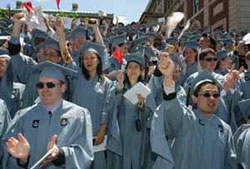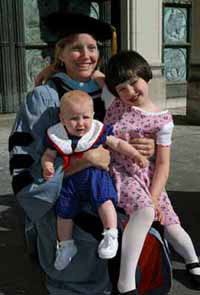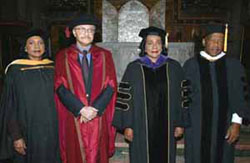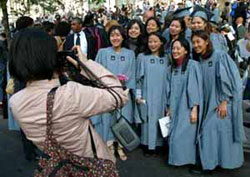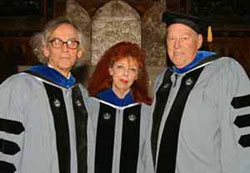Teachers College Convocation Highlights Enduring Values of Equity, Opportunity and Access
The graduating class of 2002, at all institutions, completed its term under the shadow of September's terrorist attacks. Inevitably, many commencement addresses focused on how those events will affect the future for the graduates and for us all. Teachers College chose, instead, to emphasize the struggle for equity in education by honoring four people who played an important role in shaping America's civil rights policies. TC President Arthur Levine praised the medalists as "four champions of equity-leaders in a lonely battle who suffered and won victories-not personal victories but victories for humanity."
The recipients of the Teachers College Medal for Distinguished Service to Education were Cheryl Brown Henderson on behalf of her father, the late Reverend Oliver L. Brown, Congressman John Lewis, David Levering Lewis, and Coretta Scott King.
The first medal was presented to Henderson for her father's role in the landmark Supreme Court decision Brown et.al. vs. The Board of Education of Topeka, Kansas, which legally overturned the practice of "separate but equal" in America. The 50th anniversary of that lawsuit being brought before the Supreme Court was on May 17 of this year. The court's decision came two years later.
Derald Wing Sue, Professor of Psychology and Education, read the citation that was presented to Henderson, noting her role as founder of The Brown Foundation. "Through its work, the Brown Foundation has continued the battle for equity and understanding in education," he said. "The Foundation reminds the public that the decision marked the end of almost 100 years of legal battles in 1954, but that it was just the beginning of the end of ?separate but equal' practices in our country."
In accepting the medal, Henderson said, "Brown v. The Board of Education placed race squarely on the national agenda, insisting that this country mature into a more credible democracy."
In presenting the honorary medal to Congressman John Lewis, V.P. Franklin, Professor of History and Education, said, "In Selma, Alabama, in 1965, you lead a march to protest barriers that prevented African Americans from registering to vote. That march, now known as ?Bloody Sunday' left you unconscious and looking into the face of possible death." He added, "But that did not stop you from pursuing your goal. Despite being arrested more than 40 times and beaten on many occasions, you continued your philosophy of nonviolence."
After accepting the medal, Lewis, who is in his eighth term as a representative to Georgia's Fifth Congressional District, told the graduates, "During the height of the civil rights movement when young people, many students like you, had the courage to put their bodies on the line-we didn't have a Web site, we didn't have cell phones, we didn't even have fax machines. But we believed in the possibility of America and we were willing to put ourselves in the way. As you go forth, just get in the way and make a little noise for the good, and the beloved community will be yours."
Madonna Constantine, Assistant Professor of Psychology and Education, presented the medal to David Levering Lewis. Lewis is the second Martin Luther King, Jr. University Professor of History at Rutgers University. Constantine commended Lewis by saying, "You are responsible for providing the world with a detailed look at the life of one of the most influential African-American civil rights leaders in America-W.E.B. DuBois. After dedicating 15 years of your life to the task?you painted the picture of DuBois' life in two large volumes of work. Your works garnered you eight book awards, including two Pulitzer Prizes and a MacArthur Foundation ?genius grant.'"
Coretta Scott King, widow of Dr. Martin Luther King, Jr., was introduced by Gregory Anderson, Assistant Professor of Education in the Department of Organization and Leadership. "After your husband's tragic death, it was only a few days later that you led a march in Memphis that he was scheduled to lead. You spoke in his place at an anti-Vietnam War rally later that month."
He continued, saying, "A year later, you founded the Martin Luther King Jr. Center for Nonviolent Social Change. You have also guided the creation of the largest archive of documents from the Civil Rights Movement. Most notably, you lobbied successfully to establish your husband's birthday as a national holiday."
In her accepting remarks, King shared the following story. "Some years ago a famous rock and roll personality was interviewed about his celebrity and achievements. When asked to sum up his accomplishments, he responded, ?Not half of what I have done in the last 20 years is as important as what a teacher does in one day.'
"I believe that fellow's wisdom even more than his humility," said King. "I believe teachers in America are the force that defines the quality of America's future."
At a dinner held the night before the convocation ceremony, King explained her personal association with the College through her sister, Edythe Scott Bagley, and her sister-in-law, Christine King Farris, Martin Luther King's sister. "My sister got her degree in teaching of English," King said. "She graduated from TC in 1953." She added that her sister-in-law received two master's degrees from the College.
Remarks by President Levine followed the presentation of the medals. In his address, he highlighted two of the 1,460 graduates-Vicky Chang, for her successful program, "Mandarin and Me," that teaches elementary school students about Chinese language and culture, and Sophia Ali, who combines her 10 years of film production experience with education and psychology to produce a children's television show in Pakistan.
The final speaker of the day was Monisha D. Armstrong, student speaker who received her M.A. in Early Childhood Education Pre-Service.
The following afternoon, TC doctoral graduates were hooded in a ceremony at the Cathedral of St. John the Divine. At that ceremony, TC Trustee William Dodge Rueckert presented the Cleveland E. Dodge Medal for Distinguished Service to Education to Harold W. McGraw, Jr., former CEO and President of The McGraw-Hill Companies, for his work in literacy and education, and to the artists Christo and Jeanne-Claude, whose site-specific projects included wrapping the Reichstag in Berlin and The Umbrellas in Japan and Southern California.
Published Thursday, Jul. 11, 2002
